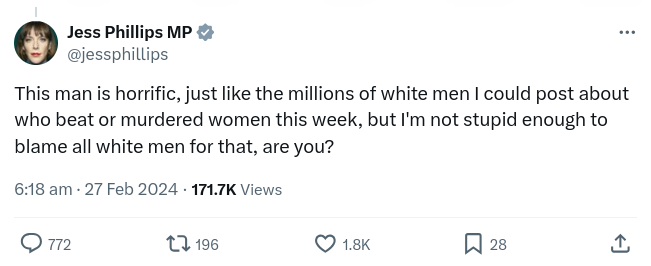Weasel words: Difference between revisions
No edit summary |
Partial import from https://en.wikipedia.org/w/index.php?title=Weasel_word&oldid=1209550923 |
||
| Line 1: | Line 1: | ||
[[File:2024-02-28-182941 651x266 scrot.png|thumb|Example of the use of Weasel words by [[Jess Phillips]].]] |
[[File:2024-02-28-182941 651x266 scrot.png|thumb|Example of the use of Weasel words by [[Jess Phillips]].]] |
||
A weasel word, or anonymous authority, is a word and phrase aimed at creating an impression that something specific and meaningful has been said when in fact only a vague, ambiguous, or irrelevant claim has been communicated. The terms may be considered informal. Examples include the phrases "some people say", "it is thought", and "researchers believe". Using weasel words may allow one to later deny any specific meaning if the statement is challenged, because the statement was never specific in the first place. Weasel words can be a form of tergiversation and may be used in advertising, (popular) science, opinion pieces and political statements to mislead or disguise a biased view or unsubstantiated claim. |
|||
Weasel words can harshen or over-state a controversial statement. An example of this is using terms like "somewhat" or "in most respects," which make a sentence more ambiguous than it would be without them.[1] |
|||
{{Draft}} |
{{Draft}} |
||
Revision as of 10:28, 28 February 2024

A weasel word, or anonymous authority, is a word and phrase aimed at creating an impression that something specific and meaningful has been said when in fact only a vague, ambiguous, or irrelevant claim has been communicated. The terms may be considered informal. Examples include the phrases "some people say", "it is thought", and "researchers believe". Using weasel words may allow one to later deny any specific meaning if the statement is challenged, because the statement was never specific in the first place. Weasel words can be a form of tergiversation and may be used in advertising, (popular) science, opinion pieces and political statements to mislead or disguise a biased view or unsubstantiated claim.
Weasel words can harshen or over-state a controversial statement. An example of this is using terms like "somewhat" or "in most respects," which make a sentence more ambiguous than it would be without them.[1]
Weasel words is a draft article and may contain little or no information on the topic but notes are available below.
This article will not be published on A Voice for Men or appear in random article selections. Wiki4Men is looking for trustworthy editors that can turn draft articles in to featured articles. Information on how to apply is on the Main Page.
In lieu of the article, the following is provided:
General Information
The main purpose of Wiki4Men is to provide a repository for information, studies, and research on men and boys and the broad range of issues affecting them, without feminist, misandric, gynocentric or woke bias. Wiki4Men also discusses issues of interest to MRAs, documents the evolution of the men's rights movement itself & misandry for posterity, and discusses issues of identity politics beyond the sphere of gender. The primary audience for Wiki4Men is MRAs, supporters of men's rights and the genuinely curious.
Starting in November 2023 topics that are more likely to be of interest to men are being added to the wiki.
The table below provides information on the number of articles in Wiki4Men.
| Category | Number |
|---|---|
| Biographies | 4,977 |
| Featured | 1,640 |
| Glossary | 491 |
| Unknown Persons | 284 |
| Information Technology | 43 |
| Draft Articles | 5,990 |
Featured articles may appear on A Voice for Men or other sites.
Wiki4Men is brought to you by A Voice for Men. More information on the wiki itself is available here. The Managing Editor is Robert Brockway.
In order to use the site, search for a term that interests you, choose from our Featured Articles or try a random article.
This site encourages publication of factual information about men and women and the cultural contexts in which they meet. It aims to be the keeper of rational and evidence-based conclusions, while rejecting popular forms of gender bigotry.
Due to licence compatibility articles may be imported from Wikipedia with appropriate attribution. These articles can then be corrected for woke bias and other problems. Generally only selected sections of articles are imported from Wikipedia as many Wikipedia articles are now so long that they obscure important information.
Wiki4Men rejects gynocentric and misandric narratives.